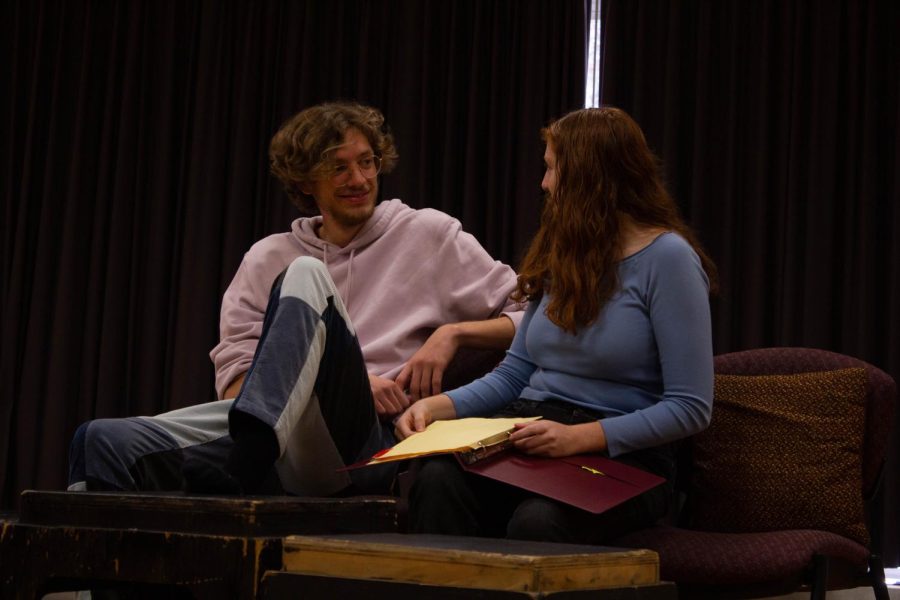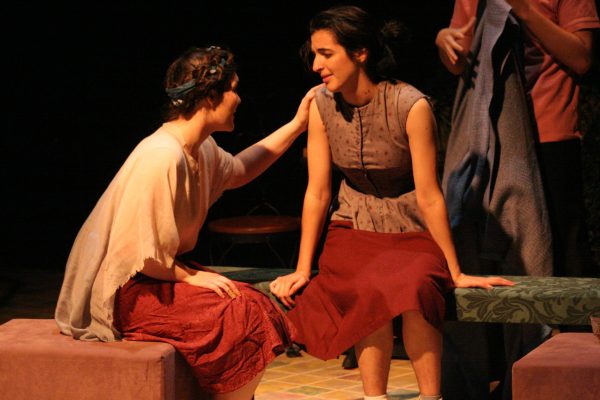Grisling Hall Deals with Grief Through Theater
Photo courtesy of Cady Hurlbert
Ansel Mills and Gina Thompson read through lines during rehearsal.
Editor’s Note: This article contains mention of death, grief, and sexual assault.
Grisling Hall is an original play written by College fourth-year Jordan Muschler that opens this evening at 8 p.m. in Wilder Main. Grisling Hall follows two siblings, Sophie and Will, as they navigate the death of their father. Their complicated grieving process becomes an exploration of memory and legacy as they reconcile with the fact that they may not have known their father as well as they thought they did. The play, at its core, is a discussion of power dynamics between faculty and students, as well as a larger exploration of institutional memory and who deserves to be remembered. Grisling Hall calls attention to the fact that many buildings on college campuses are named after people deemed important enough to be honored but whose legacies are often complex.
“I originally had the idea … when I was first touring colleges because I was looking around at the iconography that’s often named after people,” Muschler said. “I wondered, who are they? And then, what have they done? Have they done anything awful? I wanted to write about how we react to awful things. I’ve known people that have done really awful things and who are my friends, who were my relatives, and I was interested in how we reckon with having a good experience with someone personally but knowing that they’ve done something awful.”
In Grisling Hall, Sophie and Will struggle to determine whether or not their father should be remembered by people other than just themselves. Over the course of the play, Sophie and Will represent the myriad ways grief can manifest, not only in oneself but also in relation to others. The audience is forced to consider how grief can cause distance between people who care about each other — especially when that grief is unexpected. The death of their father was anticipated, but the death of their ability to idolize their father was not.
“Different parts of me are in each character,” Muschler said. “The character I’m most like is Sophie; the way that she deals with grief is the most similar to the way I deal with grief. She’s a lot more internal about it. The dad character was the most strange to write. You have to connect with him even though he’s a person who’s obviously done awful things, because otherwise he’s just a one-dimensional foil. Theater is the best medium for connecting with characters who are right in front of your eyes.”
College fourth-year Maggie Elsen, who is directing the play, agrees that theater allows its audience to connect with a story in a way other media cannot.
“Live theater especially is focused on relationships because you are physically in the space with the characters while they’re navigating the situation,” Elsen said. “In that way, live theater has a really powerful ability to convince people to think about things deeply and in a nuanced way as they experience it with the characters.”
Grisling Hall only has three characters, which narrows down the family dynamics. As an audience member, you empathize with some characters but hate others. In a way, you go through the conflicting emotions the siblings feel along with them. The actions of characters frustrate you, and yet you can’t help but want them to be better and act better. You connect to the siblings through their relationship and feel most attached to them, even though the father character is the only one that directly addresses the audience. The audience sits, it feels, in the middle of the family’s living room — almost included within the unit. Thrown into the conflict, the audience must draw their own conclusion to the unfolding events alongside the siblings.
The words sexual harm or assault are not said outright, but it is understood that this is what the play is discussing. The audience hears the words “power dynamics” and “creep,” but also sees how Sophie interacts with the two men in her family. Sophie is the only present female character, and the only other women mentioned are those who have suffered harm. Her frustration toward her brother and father is grounded in an understanding of sexual harm that comes from being a woman that they will never understand.
Humanizing someone who has committed harm may seem counterproductive, but in reality, those who commit harm are not far removed from us. By acknowledging that you can care about someone and also recognize that they have done harm and hold them accountable, the play addresses the ways in which two seemingly opposing things can coexist. Just because you know one version of someone and think you know them well doesn’t mean you know every version of them.
“I think that Oberlin students have a fear of recognizing nuance,” Elsen said. “This show is about accepting that two things can be true at the same time.”
The Grisling family invites their audience to recognize that people who do harm do not always look like monsters. The more we realize that those who cause harm can be our friends, our family, and those around us, the easier it will be to hold these people accountable and support those who have been harmed.








